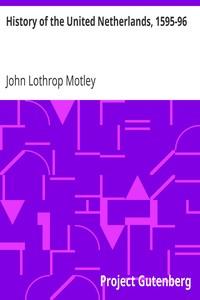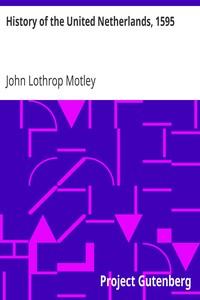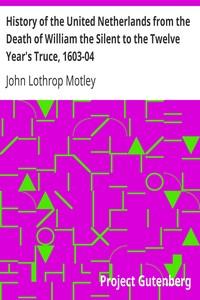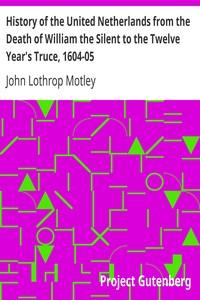|
|
Read this ebook for free! No credit card needed, absolutely nothing to pay.Words: 19817 in 5 pages
This is an ebook sharing website. You can read the uploaded ebooks for free here. No credit cards needed, nothing to pay. If you want to own a digital copy of the ebook, or want to read offline with your favorite ebook-reader, then you can choose to buy and download the ebook.

: History of the United Netherlands 1597-98 by Motley John Lothrop - Netherlands History Eighty Years' War 1568-1648@FreeBooksTue 06 Jun, 2023 Edition: 10 HISTORY OF THE UNITED NETHERLANDS From the Death of William the Silent to the Twelve Year's Truce--1609 History of the United Netherlands, 1597-1598 Straggle of the Netherlands against Spain--March to Turnhout-- Retreat of the Spanish commander--Pursuit and attack--Demolition of the Spanish army--Surrender of the garrison of Turnhout--Improved military science--Moral effect of the battle--The campaign in France--Attack on Amiens by the Spaniards--Sack and burning of the city--De Rosny's plan for reorganization of the finances--Jobbery and speculation--Philip's repudiation of his debts--Effects of the measure--Renewal of persecution by the Jesuits--Contention between Turk and Christian--Envoy from the King of Poland to the Hague to plead for reconciliation with Philip--His subsequent presentation to Queen Elizabeth--Military events Recovery of Amiens--Feeble operations of the confederate powers against Spain--Marriage of the Princess Emilia, sister of Maurice--Reduction of the castle and town of Alphen--Surrender of Rheinberg--Capitulation of Meurs--Surrender of Grol--Storming and taking of Brevoort Capitulation of Enschede, Ootmaxsum, Oldenzaal, and Lingen--Rebellion of the Spanish garrisons in Antwerp and Ghent--Progress of the peace movement between Henry and Philip--Relations of the three confederate powers--Henry's scheme for reconciliation with Spain--His acceptance of Philip's offer of peace announced to Elizabeth--Endeavours for a general peace. The old year had closed with an abortive attempt of Philip to fulfil his favourite dream--the conquest of England. The new year opened with a spirited effort of Prince Maurice to measure himself in the open field with the veteran legions of Spain. Turnhout, in Brabant, was an open village--the largest in all the Netherlands lying about twenty-five English miles in almost a direct line south from Gertruydenburg. It was nearly as far distant in an easterly direction from Antwerp, and was about five miles nearer Breda than it was to Gertruydenberg. At this place the cardinal-archduke had gathered a considerable force, numbering at least four thousand of his best infantry, with several squadrons of cavalry, the whole under-command of the general-in-chief of artillery, Count Varax. People in the neighbourhood were growing uneasy, for it was uncertain in what direction it might be intended to use this formidable force. It was perhaps the cardinal's intention to make a sudden assault upon Breda, the governor of which seemed not inclined to carry out his proposition to transfer that important city to the king, or it was thought that he might take advantage of a hard frost and cross the frozen morasses and estuaries into the land of Ter Tholen, where he might overmaster some of the important strongholds of Zeeland. Marcellus Bax, that boldest and most brilliant of Holland's cavalry officers, had come to Maurice early in January with an urgent suggestion that no time might be lost in making an attack upon the force of Turnhout, before they should succeed in doing any mischief. The prince pondered the proposition, for a little time, by himself, and then conferred very privately upon the subject with the state-council. On the 14th January it was agreed with that body that the enterprise should be attempted, but with the utmost secrecy. A week later the council sent an express messenger to Maurice urging him not to expose his own life to peril, but to apprise them as soon as possible as to the results of the adventure. Meantime, patents had been sent to the various garrisons for fifty companies of foot and sixteen squadrons of horse. On the 22nd January Maurice came to Gertruydenberg, the place of rendezvous, attended by Sir Francis Vere and Count Solms. Colonel Kloetingen was already there with the transports of ammunition and a few pieces of artillery from Zeeland, and in the course of the day the whole infantry force had assembled. Nothing could have been managed with greater promptness or secrecy. Next day, before dawn, the march began. The battalia was led by Van der Noot, with six companies of Hollanders. Then came Vere, with eight companies of the reserve, Dockray with eight companies of Englishmen, Murray with eight companies of Scotch, and Kloetingen and La Corde with twelve companies of Dutch and Zeelanders. In front of the last troop under La Corde marched the commander of the artillery, with two demi-cannon and two field-pieces, followed by the ammunition and, baggage trains. Hohenlo arrived just as the march was beginning, to whom the stadholder, notwithstanding their frequent differences, communicated his plans, and entrusted the general command of the cavalry. That force met the expedition at Osterhout, a league's distance from Gertruydenberg, and consisted of the best mounted companies, English and Dutch, from the garrisons of Breda, Bergen, Nymegen, and the Zutphen districts. The Spanish commander, on his part, had reconnoitred the advancing, foe, for it was impossible for the movement to have been so secret or so swift over those inundated roads as to be shrouded to the last moment in complete mystery. It was naturally to be expected therefore that those splendid legions--the famous Neapolitan tercio of Trevico, the veteran troops of Sultz and Hachicourt, the picked Epirote and Spanish cavalry of Nicolas Basta and Guzman--would be hurled upon the wearied, benumbed, bemired soldiers of the republic, as they came slowly along after their long march through the cold winter's rain. Varax took no such heroic resolution. Had he done so that January afternoon, the career of Maurice of Nassau might have been brought to a sudden close, despite the affectionate warning of the state-council. Certainly it was difficult for any commander to be placed in a more perilous position than that in which the stadholder found himself. He remained awake and afoot the whole night, perfecting his arrangements for the morning, and watching every indication of a possible advance on the part of the enemy. Marcellus Bax and his troopers remained at the bridge till morning, and were so near the Spaniards that they heard the voices of their pickets, and could even distinguish in the distance the various movements in their camp. Free books android app tbrJar TBR JAR Read Free books online gutenberg More posts by @FreeBooks
: History of the United Netherlands 1595-96 by Motley John Lothrop - Netherlands History Eighty Years' War 1568-1648@FreeBooksTue 06 Jun, 2023

: History of the United Netherlands 1595 by Motley John Lothrop - Netherlands History Eighty Years' War 1568-1648@FreeBooksTue 06 Jun, 2023
|
Terms of Use Stock Market News! © gutenberg.org.in2025 All Rights reserved.






